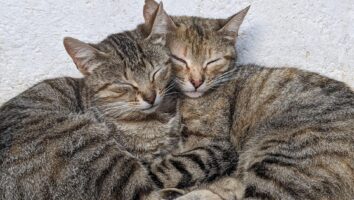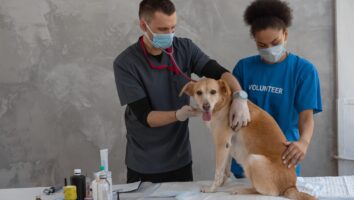Cat
Pet Medication 101: Levothyroxine
It’s important to understand a medication’s uses and side effects before giving it to your pet. This medication info sheet is meant to give you a good understanding of what DES (diethylstilbestrol)…
Pet Medication 101: Methimazole
It’s important to understand a medication’s uses and side effects before giving it to your pet. This medication info sheet is meant to give you a good understanding of what methimazole is used for,…
Pet Medication 101: Amitriptyline
It’s important to understand a medication’s uses and side effects before giving it to your pet. This medication info sheet is meant to give you a good understanding of what Amitriptyline is used…
Pet Medication 101: Clavamox
It’s important to understand a medication’s uses and side effects before giving it to your pet. This medication info sheet is meant to give you a good understanding of what Clavamox…
Pet Medication 101: Simplicef
It’s important to understand a medication’s uses and side effects before giving it to your pet. This medication info sheet is meant to give you a good understanding of what Simplicef (cefpodoxime…
Miscarriage in Cats: Symptoms, Causes, and Treatments
Pregnancy and the act of giving birth can present with complications in any living being. From the simplest form of reproduction, a single-celled organism dividing into two, to the more complex form…
Common Skin Problems in Cats
It’s no fun having a cat that is uncomfortable, and skin diseases are a common cause of discomfort. The skin is the largest organ in the body and can respond in a handful of ways to numerous…
Pet Medication 101: DES
It’s important to understand a medication’s uses and side effects before giving it to your pet. This medication info sheet is meant to give you a good understanding of what DES (diethylstilbestrol)…
Hot Spots on Cats
Hot spots, also known as acute moist dermatitis, are skin sores characterized by hair loss, redness, and purulent oozing. These sores are often considered to be self-inflicted. They form when cats…
6 Tips to Avoid Common Pet Emergencies in the Summer
The summer is an enjoyable time with bright sunshine, a cool breeze, and a furry pet by your side. Isn't it a perfect recipe for an awesome summer day? In addition to this, hiking, traveling,…
Caring for Elderly and Senior Pets: A Guide for Pet Parents
Just like humans, elderly and senior pets need special care. The age from which a pet is considered elderly depends upon multiple factors, such as breed, size, and health. Larger dogs age early as…
Why does my cat have goopy eyes?
The eyes of a cat are arguably their most recognizable body part, easily seen even from afar. Their eyes are tuned differently than ours and are more sensitive to visual stimuli. Any damage or…
Pet Medication 101: Proin
It’s important to understand a medication’s uses and side effects before giving it to your pet. This medication info sheet is meant to give you a good understanding of what Proin…
Heart Arrhythmias in Cats
Arrhythmias refer to the abnormal beats of the heart which are caused by something that disrupts the normal sequence of events that take place in the heart. An arrhythmia may be detected by your vet…
Types of Skin Infections in Cats
In cats, skin problems are caused by a vast range of conditions, from allergies and physical injury to external parasites and infections. Skin infections comprise a big portion of reported…
Glaucoma in Dogs and Cats
Though different in the level of perception and sensitivity, the anatomy of a dog and a cat’s eye is pretty much similar to ours and is also prone to the same eye problems that affect us. These…
How to Clean and Care for Your Pet’s Eyes at Home
Caring for a pet is a huge responsibility and includes making sure that they are free from harm and diseases. This includes providing the necessary preventive care. Dogs and cats require regular…
7 Tips to Prepare for Your Pet’s First Vet Visit
The first visit to the vet can be nerve-wracking both for you and your pet. It’s only natural for them to be nervous. Your furry friend doesn’t understand the point of a veterinary visit. But you…
























